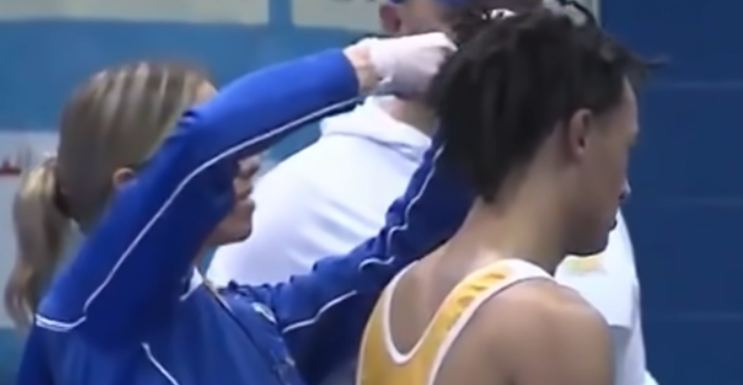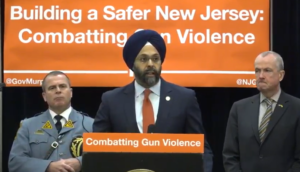After Investigation of Hair-Cutting Incident at Buena Wrestling Match, AG Grewal Announces Statewide Guidance on Hairstyle Discrimination

AG’s Division on Civil Rights Enters Agreement with NJSIAA; Referee from Buena Incident Gets Two-Year Suspension; Agreement Requires Statewide Implicit Bias Training for Officials and Staff in High School Athletics
TRENTON -- Attorney General Gurbir S. Grewal and the Division on Civil Rights (DCR) announced today that DCR has concluded its investigation into an incident in which a wrestler from Buena Regional High School had his locs cut on the mat before a wrestling match in December 2018, rather than forfeit the match because of his hairstyle. The investigation resulted in an agreement between DCR and the New Jersey State Interscholastic Athletic Association (NJSIAA), which includes a suspension of the referee involved in the incident for the next two wrestling seasons and implicit bias training for officials and staff involved in high school athletics across New Jersey.
Also today, DCR issued a new “Guidance on Race Discrimination Based on Hairstyle” to explain when treating people differently due to their hairstyle may violate the state’s anti-discrimination laws and to help prevent such discrimination in the future. The guidance states that discrimination on the basis of race includes discrimination based on a trait “inextricably intertwined with or closely associated with race,” including hairstyle. It also clarifies that policies that ban, limit, or restrict hairstyles closely associated with being Black or having Black ancestry—including twists and locs—may violate New Jersey law.
“Student athletes should be able to compete with each other on a level playing field,” said Attorney

General Grewal. “Racial discrimination in the enforcement of the rules of any sport is inconsistent with the spirit of fair play. The Division on Civil Rights’ action today makes it less likely that any student athlete will have to endure discrimination that not only undermines fair competition but also violates our state laws.”
“I also want to commend the NJSIAA for their cooperation,” Attorney General Grewal said, “and for working collaboratively with DCR to ensure equal treatment of all student-athletes.”
DCR launched its investigation following an incident that occurred on December 19, 2018, when a 16-year-old Buena Regional High School wrestler who identifies as mixed race had his locs cut while on the mat prior to a match with a wrestler from Oakcrest Regional High School.
As part of the resolution of its investigation, DCR has entered into a Memorandum of Agreement (MOA) with the NJSIAA. The NJSIAA is a private, non-profit organization that administers education-based interscholastic athletics across New Jersey and whose members include 437 high schools.
The MOA details the results of parallel investigations by DCR and the NJSIAA, including interviews with the student whose hair was cut, the referee central to the Buena incident, the NJSIAA Rules Interpreter, NJSIAA officials, members of the New Jersey Wrestling Officials Association, and the Rules Interpreter for the National Federation of State High School Associations (NFHS), which develops and publishes the rules for high school wrestling across the country, among others.
According to DCR’s investigation, the hair-cutting followed a referee’s ruling that the wrestler’s locs violated NFHS Rule 4.2.1.
NFHS Rule 4.2.1 governs the length of an athlete’s hair and when an athlete must wear a hair cover. However, that rule had previously been interpreted by various New Jersey wrestling officials to require a hair covering for several traditionally Black hairstyles regardless of hair length.
At the December 2018 Buena Regional High School wrestling match, the wrestler’s locs were cut after the referee determined that he could not wrestle without a hair cover, and the wrestler was not able to locate a hair cover that met the rules’ specifications.
As part of the agreement between DCR and NJSIAA, the NJSIAA has agreed to provide in-person training to all of its local Rules Interpreters and to all wrestling officials in the state emphasizing that Rule 4.2.1 is based solely on hair length, not on hair style. The training, which will be completed before the start of this year’s wrestling season, will also explain the long history of discrimination based on hair style.
In addition, by the end of the 2020-2021 school year, NJSIAA will provide implicit bias training to all high school sports officials in New Jersey and will require NJSIAA member schools to provide such training to all athletic administrators, coaches and athletic trainers who work in high school sports. DCR will collaborate with NJSIAA on the trainings.
“Both DCR and the NJSIAA seek to ensure that wrestling officials, coaches and athletic personnel in New Jersey interpret Rule 4.2.1 in a way that does not discriminate against Black wrestlers,” the MOA announced today states. “In particular, they seek to eliminate any interpretation of Rule 4.2.1 that allowed wrestling officials to determine that traditionally Black hairstyles were ‘unnatural’ or to subject wrestlers with traditionally Black hairstyles to differential treatment as to when a haircover was required.”
In addition to finalizing the MOA, DCR today released guidance clarifying that discrimination on the basis of race includes discrimination based on a trait “inextricably intertwined with or closely associated with race,” including hairstyle.
The guidance also clarifies that New Jersey law generally prohibits employers, housing providers and places of public accommodation (including schools) in New Jersey from enforcing grooming or appearance policies that ban, limit, or restrict hairstyles closely associated with being Black, including, but not limited to, twists, braids, cornrows, Afros, locs, Bantu knots, and fades.
“Discrimination against Black people because of their hair, which is often based on stereotypes that traditionally Black hairstyles are ’unprofessional‘ or ’unkempt,’ is a persistent form of anti-Black racism,” said DCR Director Rachel Wainer Apter. “This guidance makes clear that employers, housing providers and places of public accommodation cannot police Black hair. And the MOA will ensure that high school athletes across the State can focus on being their best, not worrying that their hair will subject them to differential treatment based on race. We are grateful to the NJSIAA for their hard work on this Agreement.”
The guidance document issued today by DCR cautions that “just as it would likely violate the LAD to refuse to hire an Orthodox Jewish man because he wears payot, or to refuse to hire a Muslim woman because she wears a hijab, or to refuse to hire a Sikh person because they wear uncut hair, it is unlawful to refuse to hire or to otherwise treat a Black person differently because they wear their hair in a style that is closely associated with being Black.”
The investigation was completed by DCR legal specialist Alexis Franklin.





